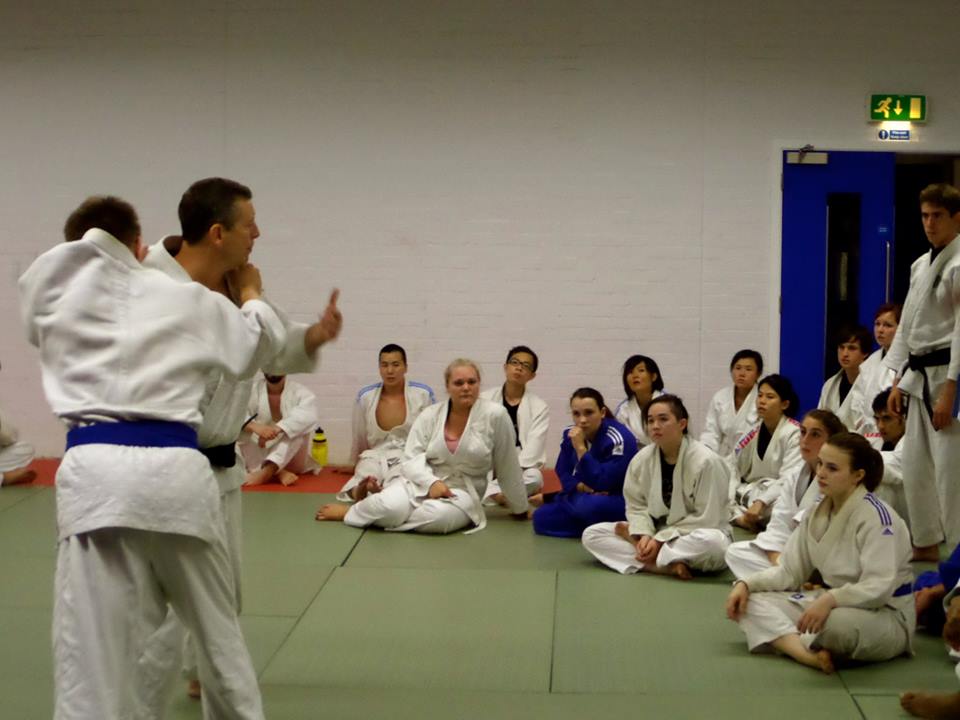Winning Olympic coach gets to grips with Warwick Judo
Everybody has a special memory from the Olympic Games. Perhaps you’re thinking of Bert Le Clos emotionally gushing about his son’s achievements, or of Usain Bolt once again seeming to break the laws of physics.
One of mine is the semi final of the women’s 78 kg judo competition. Great Britain’s Gemma Gibbons defeated her opponent to secure her place in the final and, with it, a guaranteed silver medal.
Judo was not an event I expected to stick in the memory, but Gibbons’ performance was one of the most iconic of the entire Games.
Last week Warwick Judo Club benefitted from the same quality of coaching as Gibbons herself received, with her coach, Darren Warner, coming to the university to lead their training session.
I was invited to take part in the session myself, to observe just how the club benefits from having such a decorated judoka as a guest at the club.
Prior to training a variety of Olympic and Paralympic athletes, he himself was a British champion, competing for many years at international level.
“Having worked at such a level, he just sees things differently to everyone else,” says president Antoine Remond-Tierez.
“It’s especially great for those who haven’t tried judo before – who better to give you your first impressions of judo?”
My first impression of taking part in a judo training session is a reminder of just how scrawny I am, as I put all my weight into a push, which my opponent shrugs off as a dog might shake off a particularly irritating flea. At least it’s only the warm-up.
Warner steps in, heralded by his call of “matte!” Apparently, that means ‘stop’. Lesson number one.
He explains in more detail how to correctly grip your opponent’s clothing, and introduces the exercise that clarifies the whole premise of the sport in one fell swoop: use your opponent’s body weight and balance against them.
In other words, if they’re pushing you back, pull them further. If they’re tugging at you, give them a push. The esteemed coach has made it all clear in one simple demonstration.
I observe as Warner gives one pair a tip as to how they can tweak their throw. Even the more experienced have so much to learn from a top-level trainer.
My first impression of taking part in a judo training session is a reminder of just how scrawny I am
Despite now being based in Brighton, Warner spent much of his professional judo career in Coventry, and says he relishes the opportunity to come back each year to lead the students at Warwick – although he admits that coaching beginners is actually harder than internationals.
“You have to be so technically perfect,” he explains. “You’re the only one who has to have all the answers. It’s not like at international level, where you’re working with three different tiers of coaches.”
I ask Warner what it was like to work with Gibbons at the Olympics.
Like a skilled judoka who has just been sent crashing down onto the mat, he is laid back about it all.
“It was a great experience, especially being at a home Olympics. The crowd is more behind you and there is more riding on it. But the matchday routine has to be the same as any other.
“Obviously we were delighted for Gemma. She went from having 30 Twitter followers to about 30,000 overnight. Instead of desperately rooting around for money to go out, she was being paid to be seen in places. As a coach, it suddenly becomes a case of keeping them in.
“But the athletes deserve that reward for the hard work they put in.”
Perhaps he trained the judo star of the 2016 Rio de Janeiro Games at Warwick last week – only time will tell.

Comments (2)